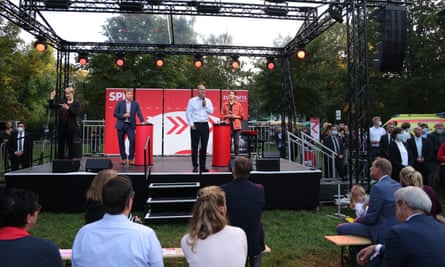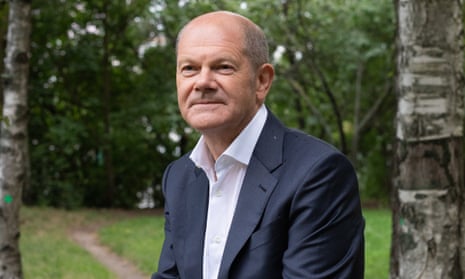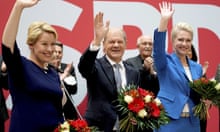The new frontrunner to win Germany’s national vote at the end of this month says he believes he can reawaken Europe’s centre-left from its decade-long slumber with a two-fold promise: to guarantee his country’s continued economic success, while at the same time putting an end to the myth that individual success is always self-made.
Germany’s vice-chancellor and finance minister, Olaf Scholz, has this summer surprisingly lifted his Social Democratic party (SPD) above Angela Merkel’s Christian Democratic Union (CDU) in opinion polls, in large part due to a reputation for rational decision-making and fiscal prudence that mirrors that of the outgoing chancellor.
In a wide-ranging interview with the Guardian, Scholz said he would also use the political victory within his reach to kickstart a fresh debate about how to redefine professional and social merit.
“Why did Britain vote for Brexit if it was against its own interest? Why did America vote for Trump? I believe it is because people are experiencing deep social insecurities, and lack appreciation for what they do,” the 63-year-old said before a campaign rally in the university city of Göttingen, in Lower Saxony.
“We see the same dissatisfaction and insecurity not just in the US or the UK but in the Netherlands, Sweden, Denmark, Finland, Norway, Austria or Germany – countries that may look from the outside like they don’t have any problems at all.
“Among certain professional classes, there is a meritocratic exuberance that has led people to believe their success is completely self-made. As a result, those who actually keep the show on the road don’t get the respect they deserve. That has to change.”
Centred around the word “respect”, Scholz’s campaign borrows heavily from Harvard philosopher Michael Sandel’s recent writings on the “tyranny of merit”, and he told the Guardian he had been left “shaken” after reading the British sociologist Michael Young’s 1958 book The Rise of Meritocracy.
“He [Young] described the rise of meritocracy as a dystopian satire of the year 2034, but it has turned out to be an almost prophetic description of the trends of our time,” Scholz said.
Thinkers such as Sandel or Daniel Markovits argue that meritocracy – a political system that aims to reward individuals on the basis of talent, effort, and achievement – has come to be dominated by educated knowledge workers who define merit solely along their own value sets and neglect to credit physical forms of labour.
“There is nothing wrong about merit as such,” Scholz said. “But it is something that must not only be limited to top-earners and those with university degrees. A security guard has merit too. Manual labourers don’t deserve less respect than academics.”
For the potential next leader of Europe’s largest economy to adopt this line of argument is significant, but in Scholz’s case also potentially risky: meritocracy was championed unironically by the third way tendency within the European and American left, in which Scholz, as a SPD general secretary during the Gerhard Schröder years, played more than a bit part.
And whether “respect” can become a coherent policy as well as a catchphrase remains unclear. “We have two tasks,” Scholz said. “Recognise these other types of merit on the one hand, and pay better wages for those who are not appropriately compensated on the other. A higher minimum wage is important, as are better wages for carers and skilled workers.”
Some of Scholz’s campaign pledges are social democratic in the old-fashioned sense: as well as the minimum wage increase to €12 an hour, he calls for the return of a wealth tax and the construction of 400,000 new homes a year. The SPD proposes replacing the sanction-tied Hartz IV unemployment benefit controversially introduced by the last centre-left government with a new, less “distrustful” welfare programme, called “citizens’ money”.
“Maybe progressive parties in Europe and the USA have for too long neglected to tackle these two big challenges,” Scholz said. As models for renewing the left, he points not to the Democratic party of the US president, Joe Biden, but social democratic parties in Sweden, Denmark and Finland.

Like its Scandinavian counterparts, even a resurgent SPD is a shadow of its former self: polls show the Social Democrats leading the election race on between 23-25% of the vote. The last time Scholz’s party won a federal election, under Schröder in 2002, it achieved 38% of the vote.
The SPD candidate’s project to reinvigorate the German centre-left remains a balancing act: for while his campaign at least partially reverses out of the rhetoric of the third way, it also seeks to steal the crown of economic competence from the centre-right CDU.
“Germany still has a very powerful industry,” said Scholz. “It is an industry with globally competitive companies, some of which are medium-sized companies with 300 to 2,000 employees. There are very few countries in the world where this tradition is so deeply anchored. We are still good at building cars, planes or satellites.”
When sketching out the task of setting Germany’s ferociously energy-hungry industry on greener tracks, Scholz sounds more similar to his centre-right rival Armin Laschet than Annalena Baerbock of the German Green party.
“Our great challenge is that we remain a car nation that is successful at making electric vehicles instead, that our industry produces chemistry, steel or cement without damaging our climate protection targets, and that we achieve this in barely 25 years.”
Private enterprise was already driving a switch to electric vehicles in the German car industry, he argued – the task that would fall on his future government would be to expand the infrastructure enabling its use. “There will be no shortage of investment capital for this new start. But […] there will need to be a charging station at every petrol stop.”
He insisted the effects of global heating could not merely be mitigated, but that “we can take significant steps to stem climate change”, and that his government would be able to do so without a radical break with Germany’s debt-averse fiscal culture.
“The debt brake is in our constitution, and modifications would need a two-thirds majority in our parliaments. In view of the CDU and FDP’s firm stance on this question, no one should build their political ideas on the possibility that the debt brake will substantially change.”
Helmut Schmidt, Germany’s Social Democrat chancellor from 1974 to 1982, is an evident role model for the SPD candidate: one TV campaign ad starts with the sound of the late fellow Hamburger’s inaugural address laid over images of Scholz striding towards the Bundestag.
Schmidt is often credited with the line that “politicians who have visions should see a doctor”, a quote Scholz said was not only apocryphal but also unfair.
“After all, he is the architect of the G6 and G7: after the collapse of the financial system in his time there was a need to coordinate the economic policies of the largest industrial nations. The same is true today: we should come up with joint response to the current challenges.”
Scholz’s commitment to European sovereignty-sharing is phrased more passionately than Merkel’s, and while the outgoing chancellor was the voice of her party on the question of further economic integration, he points to a potential route for deepening the union of states.
“By the middle of this century, the world will have 10 billion inhabitants. The EU will at this point still only have 400 million. If we want to preserve in the future the things we care about in Europe – democracy, the rule of law, individual freedoms, a market economy, a welfare state – then we have to work together.”
“That is why I believe that progress for the European Union has to be Germany’s most pressing mission right now. Even more so after Great Britain sadly left.”
The recovery package to support member states hit by the Covid-19 pandemic, pushed along by Scholz’s finance ministry in defiance of Germany’s erstwhile frugal union allies, is talked of by German conservatives not as a step towards a “transfer union” but a temporary instrument that will run out in 2027. Scholz, however, claimed it would leave a lasting legacy.
“The EU as a union is taking out joint loans to help states master this crisis. We have agreed that these liabilities will eventually be repaid. This is where the new moment comes in: these debts will not be reimbursed from national contributions based on each member state’s GDP, but from new European own resources. This will make a great difference for Europe’s future development.”










